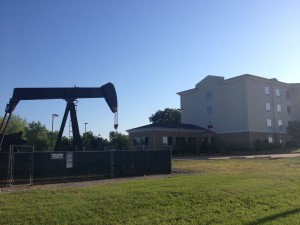Question: Is there a rule requiring a certain setback distance between a home and an oil or gas well or pipeline?
Answer: There is no state-wide setback rule for oil and gas wells or pipelines in Texas. The state agency charged with governing oil and gas production, the Texas Railroad Commission, has passed no such state-wide regulation. According to the Texas Railroad Commission website, “The Railroad Commission does not regulate how close a gas or oil well can be drilled to a residential property.”
Instead, the RRC has generally left this authority up to ordinances or zoning laws passed by individual municipalities. For example, the City of Ft. Worth passed an ordinance requiring 600 feet between an oil and gas well and a structure. The City of Denton passed an ordinance requiring a 1,200 foot setback.
Additionally, there is a provision in the Texas Local Government Code Section 253.005 that provides “a well may not be drilled in the thickly settled part of the municipality or within 200 feet of a private residence.” While the Railroad Commission seems to read this as applicable to any land leased within a municipality, the statutory provision specifically addresses leasing of minerals by a municipality and it could at least be argued this 200 foot requirement applies only to land leased by a municipality and not private landowners.
Also relevant, the International Fire Code requires that wells not be drilled within 100 foot of a structure or 75 feet of a roadway, providing very little protection for landowners. Read more here.
In light of this, what should a landowner do to protect him or her property?
1. The best protection is to ensure that this issue is addressed up front in the oil and gas lease. During negotiations with the drilling company, a mineral owner should seek to include a provision requiring an adequate setback from all structures or that requires approval from the mineral owner for locations of any wells.
2.If an mineral lease is already in place and lacks this type of language, a landowner may seek a Surface Use Agreement with a similar term. Although oil and gas companies are under no obligation to enter into a Surface Use Agreement, they are often willing to do so in order to maintain peace with the landowner. For more information on Surface Use Agreements, click here.
3. Landowners should determine whether a local ordinance has been passed that governs oil and gas setbacks on their property. This will likely only help those landowners with property within a municipality.













